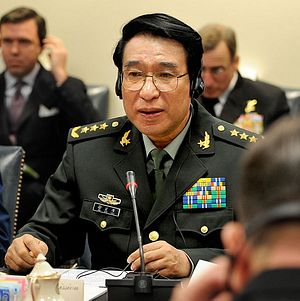Earlier this year, Xu Caihou, a former general and former vice chairman of China’s Central Military Commission, was stripped of his party membership and military rank amidst an investigation for corruption. Today, Chinese military prosecutors announced that they had concluded their investigation and were moving to formally put Xu on trial.
According to an account in Xinhua, prosecutors said that Xu had confessed to taking bribes. In particular, investigators said that Xu had “taken advantage of his position to assist the promotions of others, accepting huge bribes personally and through his family.” The bribes were “extremely large,” a statement from the military procuratorate said. The statement also said that a case against Xu had been filed, bringing it one step closer to trial.
When Xu’s was ousted from the Chinese Communist Party on June 30, he became the highest ranking military official accused of corruption, and the highest-ranking military officer investigated for any reason since the Deng Xiaoping era began. Other PLA leaders were quick to close ranks, voicing their support for Xi Jinping’s anti-corruption campaign in state media outlets.
Though the decision to strip Xu of military rank and Party membership was technically the beginning of the legal investigation into his case, in practice Xu’s fate was already decided by June 30. The legal investigation into Xu (coming after the Party had already made its decision) was only a formality, as is Xu’s upcoming trial. But the trial of such a high-ranking military officer does have strong symbolic value, especially with this announcement coming days after the conclusions of a Party meeting focused entirely on the “rule of law.”
The Fourth Plenum promised to increase judicial independence and government accountability and transparency. While these reforms are largely aimed at the civilian legal system, Party leaders made a special point of emphasizing that China’s military will also be subject to the rule of law.
A commentary in Xinhua highlighted the PLA’s promise to “steadily promote the law in military building and national defense.” In the military context, as in the civil, promoting the “rule of law” is largely aimed at controlling the power (and abuses of power) of local officials. In the military context, that means local military commanders. Wang Fa’an, a professor at the PLA Academy of Military Sciences interviewed for the Xinhua piece, emphasized the need for greater “external inspection and supervision of the military” in order to prevent corruption within the ranks. The PLA has already increased restrictions on the use of public funds as well as tightening auditing of military expenses.
The news of Xu Caihou’s upcoming trial provides a vivid illustration of Xi Jinping’s commitment to enforcing the rule of law within China’s military. Yes, it will be another “show trial” in the vein of Bo Xilai (and the legacy stretches even farther back to China’s original show trial — that of Jiang Qing and the “Gang of Four”). The verdict is predetermined; there is no chance that Xu will be found innocent. But it’s precisely the “show” that is important: having a top military official stand before a judge sends a strong message that the PLA itself is beholden to the legal system. Should this trial be largely public and heavily covered by the media, as Bo’s trial was, it would hammer the point home even more strongly.
Xu’s trial is one more indication of the “softer” side of China’s military modernization drive. In addition to the “hard” aspects (developing new weapons and technologies for military use), Xi’s vision for a modern military involves the restructuring and redistribution of power within the PLA, a topic The Diplomat discussed with National Defense University’s Phillip Saunders earlier this month. Xu’s coming trial is a shot over the bow for Chinese military officials. Just as the Bo Xilai trial (and eventually the Zhou Yongkang trial) signaled to civilian officials that there were limits to their power, Xu’s downfall serves as a warning to the PLA leadership that excesses will not be tolerated.
































